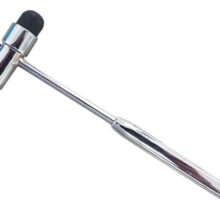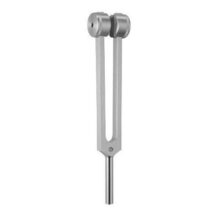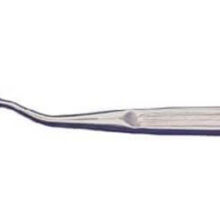Neurological Hammer with Brush & Needle
Se connecter pour obtenir les prix des revendeurs
Neurological hammer for assessing muscle stretch and other reflexes. Includes brush and needle.
Neurological and sensory instruments play a crucial role in sports medicine, enabling healthcare professionals to assess and address neurological and sensory impairments that can affect athletes’ performance and overall well-being. These instruments provide valuable insights into athletes’ nervous system function, sensory perception, and cognitive abilities.
In this article, we explore the importance of neurological and sensory instruments in sports medicine and how they enhance assessment, rehabilitation, and performance optimization.
Neurological and sensory instruments facilitate a comprehensive assessment of athletes’ nervous system function and sensory perception. Tools such as neurocognitive tests, balance assessment systems, and sensory evaluation devices allow healthcare professionals to evaluate cognitive abilities, balance control, proprioception, and sensory processing. These assessments help identify potential deficits or abnormalities that may impact an athlete’s performance, reaction time, coordination, or injury risk.
By conducting comprehensive assessments, healthcare professionals can tailor interventions and develop targeted rehabilitation programs to address specific neurological or sensory impairments.
Neurological and sensory instruments are essential in establishing baseline measurements and managing sports-related injuries. Baseline testing, such as neurocognitive assessments, balance tests, and sensory evaluations, provides a reference point for comparing an athlete’s pre-injury status to post-injury evaluations. This information aids in diagnosing concussions, monitoring recovery progress, and making informed decisions regarding return-to-play protocols.
By utilizing these instruments, healthcare professionals can objectively assess an athlete’s neurological status, track changes during recovery, and ensure that athletes are ready for safe return to sport.
Neurological and sensory instruments enable healthcare professionals to monitor athletes’ performance and progress over time.
By using tools like reaction time tests, cognitive assessments, or sensory perception evaluations, healthcare professionals can track changes in neurocognitive function, sensory acuity, or motor skills.
Monitoring an athlete’s performance and progress allows for early detection of potential issues or declines in function, enabling timely interventions and adjustments to training or rehabilitation programs. These instruments provide objective data to assess an athlete’s readiness, guide performance optimization strategies, and prevent overuse injuries or performance plateaus.
Neurological and sensory instruments play a significant role in rehabilitation and return-to-play protocols. Tools such as balance assessment systems, functional movement screens, or sensory integration devices aid in designing individualized rehabilitation programs to address specific neurological or sensory deficits. These instruments provide quantitative data to track an athlete’s progress, guide treatment interventions, and adjust rehabilitation protocols as needed.
By utilizing neurological and sensory instruments, healthcare professionals can optimize rehabilitation outcomes, reduce the risk of reinjury, and facilitate a safe and successful return to sport.
Neurological and sensory instruments contribute to performance enhancement in sports medicine. By assessing an athlete’s neurocognitive function, sensory perception, or balance control, healthcare professionals can identify areas for improvement and design targeted training programs.
For example, reaction time training, sensory integration exercises, or proprioceptive training can enhance an athlete’s sensory-motor coordination, reaction speed, and decision-making abilities. These instruments enable athletes to maximize their performance potential by addressing specific neurological or sensory aspects relevant to their sport.
Neurological and sensory instruments are vital tools in sports medicine, providing valuable information about athletes’ nervous system function, sensory perception, and cognitive abilities. These instruments enhance assessment accuracy, facilitate individualized rehabilitation programs, guide return-to-play decisions, and optimize athletic performance.
By utilizing neurological and sensory instruments, healthcare professionals can objectively evaluate athletes’ neurological and sensory status, tailor interventions to specific impairments, and improve overall athlete care in sports medicine. The use of these instruments promotes evidence-based practice of sports medicine.

Se connecter pour obtenir les prix des revendeurs
Neurological hammer for assessing muscle stretch and other reflexes. Includes brush and needle.

Se connecter pour obtenir les prix des revendeurs
In addition to reflex testing, these hammers can also be useful for chest percussion to assess the condition of the thorax or abdomen. Triangular rubber head on a stainless steel base.

Se connecter pour obtenir les prix des revendeurs
Made of aluminum alloy, the main purpose of this tuning fork is to test hearing, but can also be used to examine and evaluate other medical conditions.

Se connecter pour obtenir les prix des revendeurs
This medical device is designed to test nerve reactions/sensitivity as it is rolled across the skin.